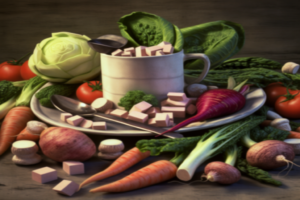Introduction:
Probiotics and prebiotics are two terms frequently associated with gut health and overall well-being. While they sound similar, they play distinct roles in supporting a healthy digestive system. Probiotics are live microorganisms that confer health benefits when consumed, while prebiotics are non-digestible fibers that provide nourishment to beneficial gut bacteria. In this article, we will delve into the world of probiotics and prebiotics, exploring their functions, potential health benefits, food sources, and considerations for incorporating them into your diet.
What Are Probiotics?
a. Definition and types: Probiotics are live bacteria or yeasts that, when consumed in adequate amounts, have a positive impact on health. The most common types of probiotics include Lactobacillus and Bifidobacterium strains.
b. Health benefits: Probiotics promote a healthy gut by restoring the balance of beneficial bacteria, supporting digestion, enhancing nutrient absorption, and strengthening the immune system. They have also been associated with improved mental health, reduced inflammation, and potential benefits for certain gastrointestinal conditions.
c. Food sources: Probiotics can be found in fermented foods such as yogurt, kefir, sauerkraut, kimchi, tempeh, and kombucha. Additionally, probiotic supplements are available in various forms, including capsules, tablets, and powders.
Understanding Prebiotics:
a. Definition and function: Prebiotics are indigestible fibers that serve as food for beneficial gut bacteria. They help nourish and support the growth of these bacteria, promoting a healthy gut environment.
b. Health benefits: Prebiotics contribute to improved digestion, enhanced nutrient absorption, regulation of bowel movements, and a strengthened immune system. They may also have a positive impact on weight management, blood sugar control, and cardiovascular health.
c. Food sources: Prebiotics are naturally found in foods such as onions, garlic, leeks, asparagus, bananas, apples, oats, and legumes. Incorporating these foods into your diet can help increase prebiotic intake.
The Gut-Brain Connection:
a. Gut microbiota and mental health: The gut-brain connection refers to the bidirectional communication between the gut and the brain. Emerging research suggests that the composition of gut bacteria can influence mental health and emotional well-being. Probiotics have shown potential in improving symptoms of anxiety, depression, and stress.
b. Modulation of neurotransmitters: Probiotics may impact the production and function of neurotransmitters, such as serotonin, dopamine, and gamma-aminobutyric acid (GABA). These neurotransmitters play a vital role in mood regulation.
c. Considerations for mental health: While more research is needed, incorporating probiotic-rich foods or supplements may be beneficial for individuals experiencing mental health challenges. However, it is important to consult with a healthcare professional before making any significant changes to your diet or supplementation routine.
Incorporating Probiotics and Prebiotics into Your Diet:
a. Balanced and varied diet: Aiming for a balanced and varied diet that includes a wide range of fruits, vegetables, whole grains, lean proteins, and fermented foods can naturally provide probiotics and prebiotics.
b. Probiotic-rich foods: Include probiotic-rich foods in your diet, such as yogurt, kefir, sauerkraut, kimchi, tempeh, and kombucha. Choose products that contain live and active cultures to maximize probiotic benefits.
c. Prebiotic-rich foods: Increase your intake of prebiotic-rich foods like onions, garlic, leeks, asparagus, bananas, apples, oats, and legumes. These foods provide the necessary fibers to nourish beneficial gut bacteria.
d. Probiotic supplements: If you struggle to consume probiotic-rich foods regularly, consider probiotic supplements. However, it is important to choose high-quality supplements from reputable brands, and consult with a healthcare professional for personalized advice.
e. Prebiotic supplements: Prebiotic supplements are also available and can provide concentrated sources of prebiotic fibers. These can be used to supplement your diet, particularly if your prebiotic intake is limited.
Other Considerations:
a. Individual needs and sensitivities: Everyone’s gut microbiota is unique, so it is important to pay attention to your body’s response to probiotics and prebiotics. Some individuals may experience digestive discomfort or gas when first incorporating them into their diet. Start with small amounts and gradually increase intake to assess tolerance.
b. Antibiotic use: Antibiotics can disrupt the balance of gut bacteria. If you are taking antibiotics, it is recommended to separate the timing of probiotic consumption to maximize their effectiveness. Consult with your healthcare provider for personalized advice.
c. Storage and preparation: Proper storage and preparation of probiotic-rich foods are important to maintain the viability of live cultures. Follow recommended storage instructions and avoid excessive heat or prolonged exposure to air.
Conclusion:
Probiotics and prebiotics play distinct roles in supporting a healthy digestive system and overall well-being. Probiotics contribute to a balanced gut microbiota, while prebiotics provide nourishment to beneficial gut bacteria. Incorporating probiotic-rich foods, such as yogurt and fermented vegetables, and prebiotic-rich foods, like onions and bananas, into your diet can naturally support gut health. Additionally, supplements can be considered, but it is important to choose high-quality products and consult with a healthcare professional for personalized advice. By understanding the role of probiotics and prebiotics and making conscious choices to include them in your diet, you can enhance your digestive health and promote overall wellness.







